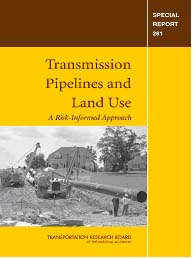
The Pipeline Safety Improvement Act (PSIA) of 2002 required the Secretary of Transportation, in conjunction with the Federal Energy Regulatory Commission (FERC) and other appropriate federal and state agencies and local governments, to undertake a study of land use practices, zoning ordinances, and preservation of environmental resources with regard to pipeline rights-of-way and their maintenance. The Act also required the Secretary to promote the adoption of practices, laws, and ordinances by federal agencies and state and local governments in reducing the risks and hazards associated with encroachment on pipeline rights-of-way.
TRB Special Report 281
In light of the PSIA requirements, PHMSA contracted with the TRB to study the feasibility of developing risk-informed land use guidance for application adjacent to transmission pipelines. The TRB convened an expert committee of 12 members from academia, pipeline industry, local governments, and consultants to conduct the study and provide recommendations to OPS. The TRB Special Report (SR 281) was published in September 2004.
The TRB committee made the following recommendations to PHMSA:
- Develop risk-informed land use guidance for application by stakeholders
- The process for developing the guidance should
- involve the collaboration of all stakeholders
- be conducted by persons with expertise in risk analysis, risk communication, land use management, and developing regulation
- be transparent, independent, and peer reviewed and
- incorporate learning and feedback to refine the guidance over time
- The transmission pipeline industries should develop best practices for the specification, acquisition, development, and maintenance of pipeline rights-of-way (ROW).
These recommendations are being implemented by PHMSA through the Pipelines and Informed Planning Alliance (PIPA).
